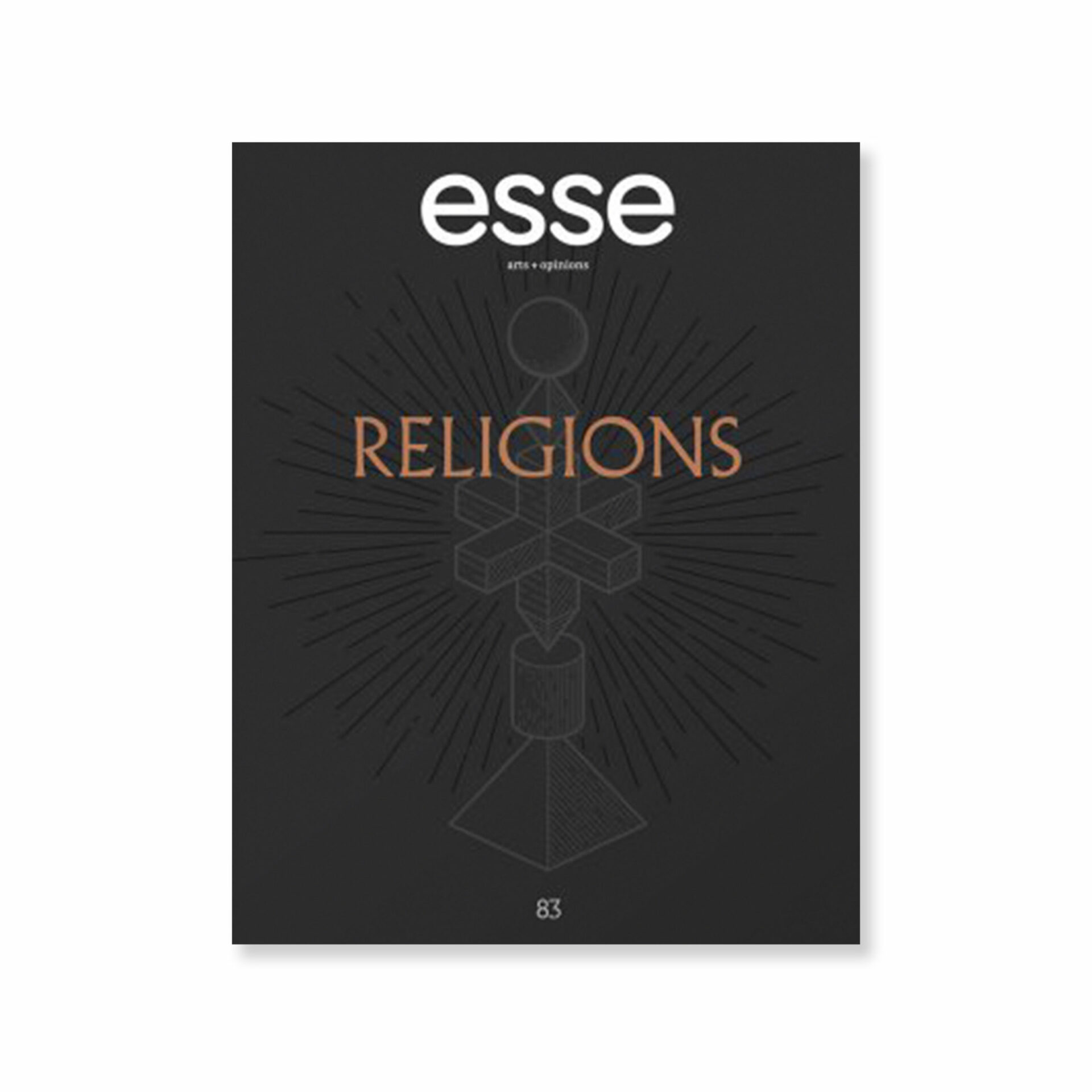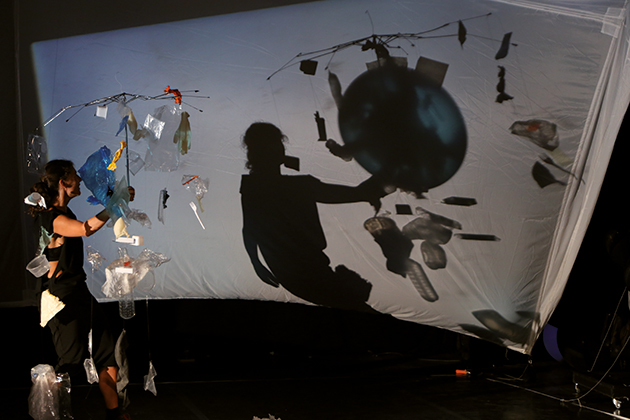
So, there exists a form of original utterance that speaks of the present, of definitive presence, of completion, of the fulfilment of time, and which, because it speaks of it in the present, must always be brought forward to compensate for the inevitable backsliding of the instant towards the past …1 1 - Bruno Latour, Rejoicing or the Torments of Religious Speech, trans. Julie Rose (Cambridge: Polity Press, 2013), 118.
“In their flight toward the future, the Moderns are absent to themselves.” Bruno Latour uttered this sentence during the Speculative Gestures colloquium organized by Isabelle Stengers and Didier Debaise at Cerisy-la-Salle in July 2013. In his Gifford Lectures entitled “Facing Gaia: Six lectures on the political theology of nature,” pronounced just a few months before in Edinburgh, Latour explained what he meant by this rather enigmatic description of the Moderns. Contrary to what they often say of themselves, Modernists are not forward-looking, but almost exclusively backward-looking creatures. This is why the irruption of Gaia surprises them so much. Since they have no eyes in the back of their head, they deny it is coming at them at all, as if they were too busy fleeing the horrors of the times of old. It seems that their vision of the future had blinded them to where they were going; or rather, as if what they meant by the future was entirely made of their rejected past without any realistic content about ‘things to come.’ (French usefully distinguishes between ‘le futur’ and ‘l’avenir.’)2 2 - Bruno Latour, “War of the Worlds: Humans against Earthbound,” Facing Gaia: Six lectures on the political theology of nature, 106. www.bruno-latour.fr/sites/default/files/downloads/GIFFORD-SIX-LECTURES_1.pdf, accessed October 10, 2014.
Latour gave flesh to this suggestive image of thought through a short dance choreography video he curated as part of his Gifford Lectures. Starring Stefany Ganachaud and filmed by Jonathan Michel, The Angel of Geostory shows a woman walking backward, facing the past. Unlike Walter Benjamin’s angel of the past irremediably blown over by a storm coming from the depth of history and pushing him relentlessly towards the future, the angel of Geostory does at some point turn its gaze toward the future (and toward the camera). The expression on her face immediately turns into absolute horror. She then changes direction and starts moving from where she came, her eyes glued on the threatening Gaia suddenly revealing itself to the inattentive Modern who had only been concerned, up until now, with what she was leaving behind.
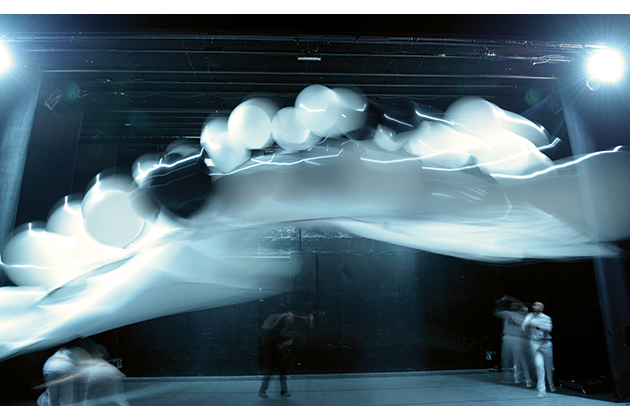
Comédie De Reims, 2013.
Photo : © Pascal Gély
This piece features in the Gaïa Global Circus, an ambitious theatrical experiment created in 2013 that seeks to address the discrepancy between the gravity of the ecological crisis and our inability to react appropriately to it. We are witnessing, Latour says, a movement of “understandable withdrawal in front of the coming apocalypse.”3 3 - Bruno Latour, “L’apocalypse est notre chance,” Le monde, September 20, 2013. www.lemonde.fr/idees/article/2013/09/20/bruno-latour-l-apocalypse-est-notre-chance_3481862_3232.html (author’s own translation), accessed October 10, 2014. Gaïa Global Circus is a climatic tragicomedy that not only tries to represent the current ecological crisis, but attempts at plunging into the internal drama of science. For Bruno Latour indeed, the piece is a rigorous effort at dramatizing the problems of science, following the principle according to which “a good scientific experimentation is like a theatrical situation of dramatization.”4 4 - Bruno Latour, “Gaïa Global Circus, une tragi-comédie climatique,” Philosophie magazine, November 11, 2013. www.philomag.com/lepoque/breves/bruno-latour-gaia-global-circus-une-tragi-comedie-climatique-8472, accessed October 10, 2014 Gaïa Global Circus wants to produce a common aesthetics from which a renewed capacity for responsiveness might emerge, a sharing of the sensible (partage du sensible) that could enlarge the inadequate and “limited repertoire of concepts and feelings” with which we are equipped to face the Anthropocene era that has just begun.
The question of how to generate an active relation to the future is crucial to Latour’s work. Surprisingly, he places his reflection on the matter under the sign of apocalypse. Apocalypse for Latour ties in closely with how post-human Gaians or, to use Latour’s preferred formulation, the “Earthbound,” might envisage the future and inhabit the present in a renewed way. It is an essential historical ingredient that, he suggests, should not be left aside in our attempt to weave in new ways “the various threads of geostory.”6 6 - Bruno Latour, “Agency at the Time of the Anthropocene,” in New Literary History 45, No.1 (2014): 15.
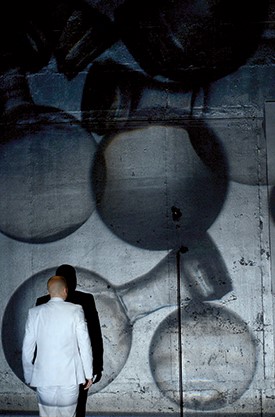
Photo : © Pascal Gély
Latour proposes a practical definition of apocalypse that rejects its common assimilation with the idea of catastrophe, bringing forth without explicitly mentioning its original meaning as “revelation.”
“Apocalypse signifies the certitude that the future has changed shape, and that we can do something. It’s as if the form of time had changed and that, therefore, we could now at last do something. It is a thought for action against stupor and panic. … apocalypse is the understanding that something is happening and that we must make ourselves worthy of what is coming to us. It is, in fact, a revolutionary situation.”7 7 - Bruno Latour, “L’apocalypse est notre chance.”
This passage could allow for an extended theological exegesis. I will try to stay as brief as possible, focusing on how Latour envisages the idea of apocalypse in relation to a transformed — activating — relation to the future. The certitude of which Latour talks with regard to the change that affects present time bears surprising similarity with how Christianity conceives of faith as what makes the future present in the subject who believes.8 8 - For more details, see the unexpectedly thought-provoking Spe salvi (2007), Benedictus XVI’s encyclical letter about hope.
Even though he talks about certainty in his own account of apocalypse, Latour would most certainly contest a definition of faith that involves a dimension of belief. “Faith and belief have nothing to say to one another”9 9 - Bruno Latour, “‘Thou Shalt Not Take the Lord’s Name in Vain’: Being a Sort of Sermon on the Hesitations in Religious Speech” RES: Anthropology and Aesthetics, No. 39 (Spring 2001): 215 – 34 (231). Latour vehemently maintains; a distinctive component of his work aims precisely at debunking the notion of belief. The entirety of his book On the Modern Cult of the Factish Gods is dedicated to showing that “a Modern is someone who believes that others believe,”10 10 - Bruno Latour, On the Modern Cult of the Factish Gods, trans. Catherine Porter and Heather MacLean (Durham and London: Duke University Press, 2010), 2. and how we should do without a category that produces an undesirable distinction between interiority and exteriority, passivity and activity, theory and practice. And indeed, belief is just too reductive and subjective a category when it comes to giving a proper — that is, fantastic, ambitious, and in the end, realist enough — account of how the world as we experience and discover it is composed of indivisible events irreducible to a strict subject – object division.
Latour doesn’t mobilize the resources of apocalypse in the name of religion understood as some sort of supplément d’âme for a desolated “material” world. He doesn’t want to spiritualize or re-enchant the world — presenting things in this way would mean that one has already lost the (ever-enchanted) world in the first place. On the contrary, as he nicely puts it, “The symbolic is the magic of those who have lost the world. It is the only way they have found to maintain in addition to “objective things” the “spiritual atmosphere” without which things would “only” be natural.”11 11 - Bruno Latour, “Irreductions,” in The Pasteurization of France, 187. One can also think of this famous passage from We Have Never Been Modern: “They [the antimoderns] take on the courageous task of saving what can be saved: souls, minds, emotions, interpersonal relations, the symbolic dimension, human warmth, local specificities, hermeneutics, the margins and the peripheries. An admirable mission, but one that would be more admirable still if all those sacred vessels were actually threatened.” Bruno Latour, We Have Never Been Modern, trans. Catherine Porter (Cambridge: Harvard University Press, 1993), 123. If anything, Latour wants to bring our attention to the dimension of (real) futurity insisting in every present. In this sense, faith is about nourishing a noble and speculative disposition towards the future, one that participates decisively to the plural arts of immanent attention.
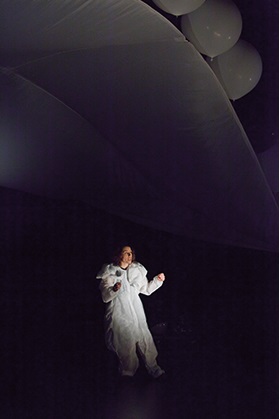
Photo : © Gaïa Global Circus
Adam S. Miller’s remarkable Speculative Grace: Bruno Latour and Object-Oriented Theology underlines how, for Latour, religion is an ethical exercise in immanent attention aimed at staying with the historical trouble — a training to live by and speak from things. “Religion, Miller says, is what breaks our will to go away.”12 12 - Adam S. Miller, Speculative Grace: Bruno Latour and Object-Oriented Theology (New York: Fordham University Press, 2013) 145. Against the grain of the usual association of religion with the other-wordly, Latour affirms that “it is religion that attempts to access the this-worldly in its most radical presence ….”13 13 - Bruno Latour, “Will Non-Humans Be Saved? An Argument in Ecotheology,” Journal of the Royal Anthropological Institute, Vol. 15 (2009), 459 – 75 (464), cited in Adam S. Miller Speculative Grace: Bruno Latour and Object-Oriented Theology, 157. Inversely, he can’t seem to have harsh enough words for any form of escapism: “The dream of going to another world is just that: a dream, and probably also a deep sin.”14 This immanentist conception of religion is closely related with Deleuze’s idea of believing in the world. What matters here is how value is introduced in the world, or in other words, how a certain mode of existence is intensified and brought to its creative limit.14 14 - For more details about belief in the world as an artful and activating power, see my “无间道 (wu jian dao): Deleuze and the Way without Interstices,” Proceedings of the 2012 Kaifeng International Deleuze Conference, ed. Paul Patten (Kaifeng: Henan University Press, 2013).
We have gathered enough elements to give a concluding, if not entirely satisfactory, account of how Latour conceives of the headlong rush of the Moderns. Moderns are damned insofar as they believe the truly rationalist way to be in the world is by flattening futurity. In this perspective, materialism is the ultimate idealism. Matter is that illusory substance that supposedly flows purely “from past to present,”15 15 - Bruno Latour, “Agency at the Time of the Anthropocene,” 10. that other-worldly thing in which “the consequences are already there in the cause,” and for which therefore there is “no suspense to expect, no sudden transformation, no metamorphosis, no ambiguity.”16 16 - Ibid., 10. In their unbounded nihilism, Moderns too would like to simply flow from past to present. Their conception of de-animated matter conflates with the most insane of ascesis, that of becoming a pure and unreal flow of information without transformation.
Inversely, and against all odds, Latour includes the notion of apocalypse within a complex and, at least at first sight, paradoxical understanding of how “in the real world time flows from the future to the present.”17 17 - Ibid., 13. Life thus appears as a zone of contingent, metamorphic, and always somehow miraculous encounters. Acting as some sort of secular prophet of the puzzling Gaia, Latour exposes us to a civilizational choice. He calls us to stand up to the challenge posed by an animated and inherently dramatic materiality, one that is produced by a constant and active re-addressing of time that commands “a realist definition of the many occasions through which agencies are being discovered.”18 18 - Ibid., 14. There opens a realist drama of presence, in which things are thrown in the risky business of existing and “organisms-that-person” proliferate joyfully.
